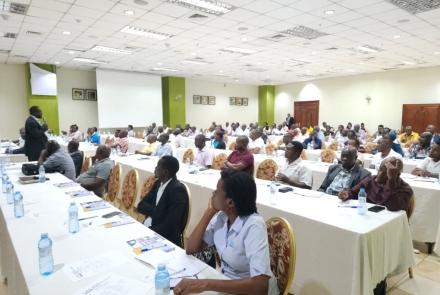By CPA John Sebuuma
Member, Tax & Economic Policy Committee – ICPAU
Sebuuma & Associates, CPAs
The Government of Uganda on 28th March 2024 through the Minister of Finance, Planning and Economic Development tabled the proposed National Budget for the financial year 2024/25 amounting to UGX58.34 trillion.
The National Budget was tabled as mandated for the Minister of Finance, on behalf of the President, to present the proposed annual budget of the financial year to parliament by 01st April of the preceding financial year as provided for under s.13 of the Public Finance Management Act, 2015.
The intention and focus of the coming year’s budget is on the full monetization of the economy of Uganda through agriculture, industrialization, expanding and broadening services, digital transformation and market access.
The Minister as mandated under s.8 of the Public Finance Management Act, 2015 further accompanied the proposed budget with tax bills which give the government power to obtain money from taxes and other impositions, and the five tax bills include;
- The Income Tax (Amendment) Bill, 2024
- The Value Added Tax (Amendment) Bill
- The Tax Procedures Code (Amendment) Bill, 2024
- The Excise Duty (Amendment) Bill, 2024
- The Stamp Duty (Amendment) Bill, 2024
The tax amendment bills are estimated to generate UGX1.9 trillion (3.3% of the budget) in tax revenue and among these tax bills includes an amendment under s.3 of the Income Tax (Amendment), 2024 inserting s.5A to the Income Tax Act which imposes 5% tax on gains of voluntary disposal of non-business assets.
The said amendment under s.3(2) of the tax amendment bill provides that the tax shall arise from the voluntary disposal of the following;
- Shares of a private company
- Land in cities and municipalities except the principal place of residence; and
- Rental property that is subject to rental tax under s.5 of the Income Tax Act.
The amendment provides for an exception and seeks to exclude gains from disposal of non-business assets in the following circumstances;
- By voluntary disposal of non-business assets through auction, court order, mortgages, divorce settlement or spousal separation agreement;
- The transmission of non-business assets of the deceased to a trustee or beneficiary, or
- Arising from the disposal of investment interest of a registered venture capital fund or private equity.
Other considerations in this provision include;
- This 5% tax on the gain of voluntary disposal of non-business assets shall be paid within 15 days after the disposal or transfer of the said asset.
- A person who fails to pay the tax imposed within the 15 days shall be liable to pay 2% simple interest per month on the amount unpaid from the date on which the payment was due until the date when the payment is made.
- Where a person who has disposed of a non-business asset shall provide in writing to the Uganda Revenue Authority details of the disposal within 15 days from the date of the disposal.
- The amendment bill provides for the definition of a “non-business asset” to mean and include;
- Shares of a private company
- Land in cities and municipalities except the principal place of residence
- Rental property that is subject to rental tax; and
- Exclusion of business assets.
The Government has in the previous years proposed amendments seeking to tax purchase of land;
- In 2020, government proposed a bill that a resident person who purchases land, other than land which is a business asset, from another resident person would account for withholding tax at the rate of 0.5%.
This proposal was rejected by Parliament on the basis that it was amounting to double taxation and would result in increase in the prices of land.
- Last year 2023, Government proposed to re-introduce the tax on land at the rate of 5% deductible on the gross payment made by a person who purchases any land situated in Uganda.
This proposal was withdrawn by Government and maintained the capital gains tax on disposal of a business asset.
The lacuna in the law which the proposal seeks to close:
In the recent decided case on Makerere University Retirement Benefits Scheme v Uganda Revenue Authority & Pokino Properties Limited TAT Application No.17 of 2021 where Applicant purchased land from the second respondent, a business dealing in the buying and selling land and property which it holds as stock.
They entered in a transaction of sale of land worth UGX10 billion, which the URA assessed the applicant WHT at 6% amounting UGX600 million.
The second respondent further stated that the transaction they had with the applicant was a sale of land in stock of trade and thus was not subject to withholding tax.
The Tribunal held that the seller was selling stock in trade and thus the purchaser had no obligation to withhold tax as the land sold was not a business asset.
The Tribunal further discussed that inventory used in the ordinary course of the business but is not in the strict sense an “asset” of the business. If it would hold that business assets include all items used in the ordinary course of the business because they are “sold” or “ready for sale” are to attract WHT, it would mean business assets would extend to stock in trade and would imply that street vendors such as tomato sellers whether registered or not should withhold tax on all goods they sell.
The proposal seems to remove ambiguities whether an asset is a business asset or non-business asset and both business and non-business assets will be subject to tax on the gain at disposal.
Illustration of the computation of the tax on the land transactions
Kasirye purchased an acre of land in Mukono, which is not his principal place of residence, at a purchase cost of UGX50M and voluntarily sells it at UGX150M. The total profit or gain on disposal of the land is UGX100M (150M – 50M). He will be required to pay a tax of UGX5M (5% of 100M profit).
He will also be required to pay the resultant tax within 15 days from the date of the sale and will further be required to inform the Uganda Revenue Authority by providing in writing details of the sale within 15 days.
Failure to pay the tax will render him non-compliant and will have to pay the principal tax and will suffer 2% simple interest per month until when the tax is paid.
What is the effect of this proposed amendment on the economy?
Land under the law includes fixtures like buildings which are permanently attached to the land as discussed in the case of ATC Uganda Limited & Another V Kampala Capital City Authority (Civil Suit No. 323 of 2018).
The implication of this tax amendment is that sales or transfer of land which is voluntarily disposed of in the jurisdictions of cities and municipalities with the exception of a principal place of residence and also the sale and transfer of rental property subject to rental tax voluntarily disposed of would be liable to the 5% income tax on the gain (profit) on disposal.
This proposal will result and impact the economy in the following ways;
- Increase in property values: There will be a general increase in the price of properties not only in cities and municipalities but in other jurisdictions.
Land being a factor of production will adversely affect in cost of investment and also discourage those who would wish to dispose of some of their properties to invest in economic activities.
- Increase in rent: There will be an increase in rental prices for both business and residential properties due to higher cost of construction due to the tax on purchase of land.
- Unfair computation of gains on disposal: The proposal seeks to charge tax on a gain or profit on disposal ignoring indexation of the cost base.
Due to the effects of inflation in the economy which is an adjustment of the cost base of the property as a critical parameter in determining the gain or profit generated on disposal, this will lead to the computing gains based on an unadjusted cost base leading to computing higher and unrealistic gains.
- Ambiguities in the law: Key terms have not been clearly interpreted in the proposed law for instance a principal place of residence which could lead to unfair and inequity of taxing where the sale of land attached to residence might be taxed for one individual and exempt for another which defies the canons of taxation of equity and fairness.
The proposed amendment further seeks to treat rental property as a non-business asset yet rental property generates business income thus leading to treatment of rental property differently for purposes of rental tax and capital gains at disposal which will certainly create ambiguity.
- Potential conflicts under the tax law: Under s.21(1)(k) of the Income Tax Act provides for an exemption of tax on income from non-business assets however under s.3 of the Income Tax Amendment the bill seeks to propose tax non-business assets which will create a conflict in provisions of the law in case s.21(1)(k) is not amended.
- Discriminative application: The proposed law seeks to apply to only jurisdictions of cities and municipalities and excludes other areas which is negative discrimination which violates the principles of fairness and equity.
- Increase in the cost of compliance: The proposal will lead to increase in the cost and burden of compliance in ensuring that they compute the accurate taxes, pay the taxes in time, and file the required detailed information in regards to the sale to the URA within the required time.
Conclusion
As Government proposes this tax on disposal of land in cities and municipalities including disposal of rental property, the economy is already hit hard and struggling with high cost of living and cost of operation which directly and indirectly affected by the cost of real property.
This will increase the cost of construction and rent which will affect Ugandans in terms of renting for business and residential purposes.





